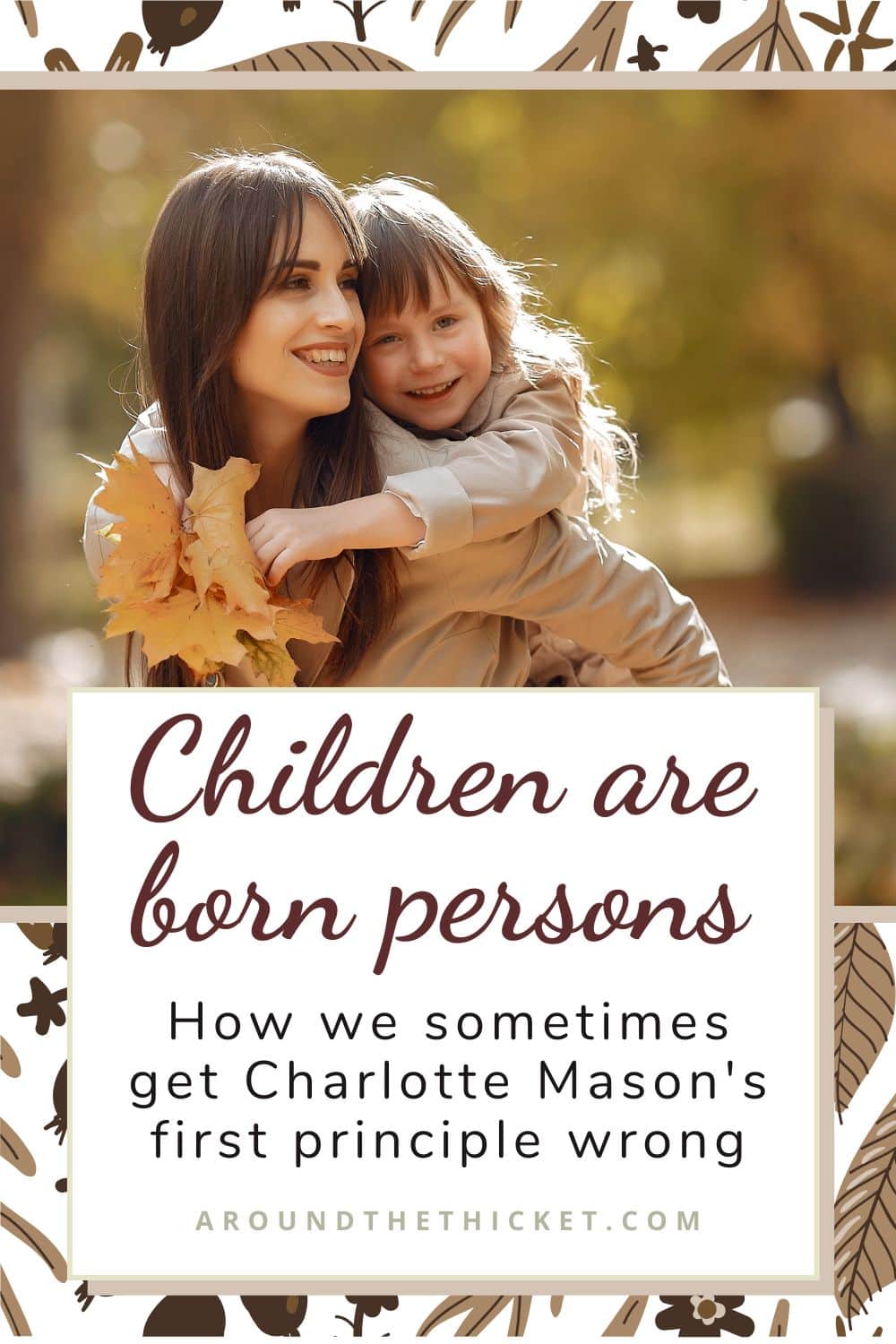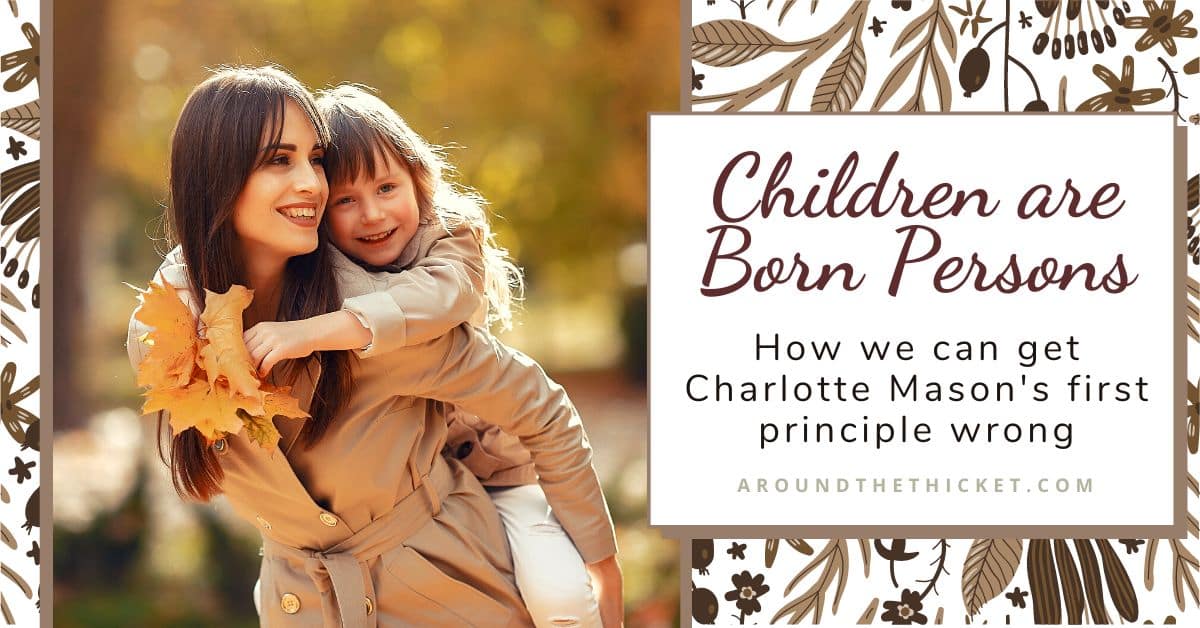Sometimes we get “Children are born persons” wrong
What does it mean that children are born persons?
This is Charlotte Mason’s first principle and one of the most important. If we don’t grasp her meaning, we will struggle to make sense of the rest of her ideas and apply them well in our homes. It is deceptively simple. We all have an intuitive understanding of what it means to be a person, and that’s where the danger lies. That intuition has very likely been formed by our culture as much as, if not more than, it has been formed by our faith. Here are a couple of ways that I see ‘Children are born persons’ used incorrectly – not in the way Miss Mason meant, and in ways that can have negative consequences.
“Children are born unique and special”
Every child is unique. It’s hard to argue with that. Having three boys, I could expound their differences for far too long. They have different personalities, different strengths and weaknesses, different interests. They are different people.
I would be mistaken, though, if I thought that they each needed a different approach to education.
From time to time, I see the phrase ‘children are born persons’ used to encourage individualized accommodations for a child. ‘Do what works for them, you are the parent and know your child best.’ As home educators, this advice is pretty reasonable. So far as we have the time and ability to make adjustments, to tweak the curriculum or to change it all together, and there are certainly times where if we can customize our child’s education, we should (think learning disabilities, gifted abilities, cultural heritage).
So far so good, but this misses Miss Mason’s fundamental point when she says that ‘children are born persons’. Rather than the individuality of children, she is making the statement that on a fundamental level, children are similar. Specifically, that children are born with a mind that begins learning from birth and has an appetite for knowledge. That the way we motivate our children can either quash or nurture this appetite. That children intuitively and naturally take specific experiences and examples and build those up into general principles. That, alongside experience and habit, narrative is the best way to communicate examples and ideas from most (though not all) disciplines and narration is the ideal tool to engage a child’s attention and help them do the work of learning. That this nourishes the mind and that the mind, like the body, needs a broad and varied diet.
I don’t think we should take a curriculum off the shelf and use it undiscerningly. But I also think that when a child finds something difficult, or even extremely easy, we need to be thoughtful about our way forward – because if we misunderstand this principle, we may find ourselves catering to weaknesses instead of building up strength.
“Parents should let children be who they are”
The idea that the wider culture and church specifically have become more and more therapeutic has been circulating for a while now. I was at university when I first heard about theraputic language and approaches coming into the church – this doesn’t refer to the very valid, necessary, and healing work of therapy, but to the idea that we want more and more to hear what will make us feel better about ourselves. We want salvation (or perhaps mental health and well-being). But we don’t want to be reminded of our sins, or of the hard work of sanctification – you aren’t actually ok just the way you are.
There are so many ways to analyze ourselves and our children. We like to find out our personality types. It’s fun to fill out a quiz online or read a book and find something that just gets us. We want to figure out our kids so we analyze how they get their energy. Maybe they are a kinesthetic learner. Maybe we should let them stay at home today or change our curriculum to be more hands on. Isn’t that how we respect our children as persons? By allowing them to be who they are?
To be very blunt, no. That’s not how Charlotte Mason showed children respect as person. She believed that leaving children to themselves, seeing their character as fixed, was an abdication of parental authority just as much as using fear or rewards was an overstepping of parental authority. To respect a child’s personhood, we use atmosphere, discipline, and life to help a child learn through experience, habit, and living ideas, to strengthen weaknesses.
It’s one thing to recognize a child’s strength and preference for hands on learning. It’s another to cater to it without considering how to build up their skill in auditory or visual learning. It’s one thing to appreciate your child’s introversion. It’s another to accommodate it to the point that they get very little experience and practice engaging in larger groups of people. And those situations are going to come up when they are adults.
Charlotte Mason believed that children needed self-knowledge, but she didn’t mean insight into their personality type. By self-knowledge, she meant insight into human nature – the fact that we face challenges and temptations, and that virtue is typically a middle road, a balance between two vices. That we all have appetites, a mind, and a will that can be used, abused, or neglected. Of course we have a unique combination of vices that we struggle with, but again, the focus here is on similarity and what it means to be human.
Raising persons
Of course, there is balance to be sought here. My argument here is largely against using ‘Children are born persons’ in a way that abdicates our responsibilities as parents, assumes that children are stuck the way they are, and forgets that they can and should grow. But we would be just as wrong to apply a Charlotte Mason curriculum with rigidity and expecting a specific outcome just because you did what it said to do on the box, without reference to your individual children.
We need to seek out the middle road, one where we can hold together the universality of personhood and the individuality of our children, keeping one eye firmly on the fact that our children need to move toward maturity, and that they probably have areas where they need help with that.
Want to find your feet with the Charlotte Mason Way?

Grab my eight day mini course on the Charlotte Mason Essentials when you subscribe to my newsletter. You’ll get daily emails, a mini podcast series, and a printable workbook with reading assignments and action steps. You’ll be on your Charlotte Mason journey in no time!






